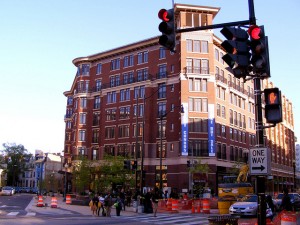Condo Fees and the Pitfalls of Preventing Displacement

Dan Reed / Flickr
Kenyon Square in Columbia Heights is where affordable condo owners are facing escalating fees.
When big condo buildings and luxury developments are built up in gentrifying neighborhoods, a common fear arises: low and moderate-income residents won’t be able to afford to stick around. Reserving affordable housing in gentrified neighborhoods seems like an obvious solution to such displacement.
That was the thinking behind the District’s Affordable Dwelling Unit program, in which developers set aside some condo units at below-market rate for people with lower incomes. The program is intended to make it possible for people with moderate incomes to remain in gentrifying neighborhoods such as Columbia Heights.
An issue the program doesn’t address is condo fees. While the program has kept mortgages down, it doesn’t have any restrictions on condo fees. Some affordable unit owners have seen their condo fees double to $400 or $750 and fear foreclosure could be imminent.
“It identifies a real problem… despite our best efforts to do the right thing,” Councilman Jim Graham said. He represents Ward 1, which is where many of these buildings are located, such as Kenyon Square. Since 2008, condo fees there have doubled to more than $400.
Manna Inc.‘s housing advocacy team has taken up the unit owners’ cause. They’ve submitted a petition to D.C. Councilmembers last month, urging them to start thinking of solutions.
“For those owners where their condo fees are close to their mortgage, it’s questionable how long they can sustain” owning their units, Sarah Scruggs of Manna Inc. said. “It’s going to mean a round of foreclosures that not only affect them and damage their credit, but it also affects their building.”
Condo fees cover common building costs, such as maintenance and repairs. All unit owners have to pay them. A board made up of unit owners typically set fees. Affordable unit owners make up a small portion of these buildings; for instance, there are only five affordable units out of 107 total in the Chase Point condo building in Friendship Heights. The market-rate for units at Chase Point start at around $600,000.
One affordable unit owner unsuccessfully ran for the condo board of City Vista in Mt. Vernon. There is now talk at the building of installing a dog park on the roof, which would be an additional expense that could increase condo fees, Scruggs said.
Market rate owners may “have a lot of money, and the things they want to do in the building, they have the money for them,” Scruggs said. “But [those things] are very different from what the affordable unit owners want.”
Some of these improvements can increase the value of the property. But according to the program, affordable condo owners are restricted from selling their units for 20 years, unless it’s to someone else who’s in the same income category, which can be difficult when condo fees are too high. Owners also can’t tap into the equity of their condos for 20 years.
“We’re in a bit of a jam,” Graham acknowledged.
Scruggs said the city needs to provide permanent subsidies to help affordable unit owners pay for increasing rates. But that would require city dollars, a tricky proposition especially in these difficult economic times.
An alternative solution is setting a cap on how high condo rates can rise for affordable unit owners, but other condo owners who would be paying more for the same amenities could view that as unfair. Also, it’s unclear even to lawmakers how many people this issue affects. Graham said the city’s Department of Housing and Community Development should begin a review of the program.
“I don’t want to sound bureaucratic, but the fact of the matter is we need to understand how widespread [high condo fees are], what kind of impact this is having on people and how to come up with a good solution,” Councilman Graham said. “All of the solutions are not immediately obvious to me.”
-
OneCity
-
Anacostiayogi
-
Anon
-
OneCity
-
AMK
-
guest



